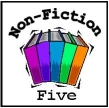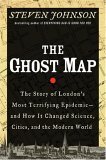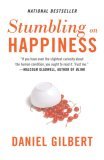

The Ghost Map by Steven Johnson is my May selection for the Non-Fiction Five Challenge. The subtitle is “The Story of London’s Most Terrifying Epidemic – and How It Changed Science, Cities, and the Modern World.” The epidemic in question is the cholera epidemic of 1854, but the book is not morbid. It focuses on the efforts of two men, Dr. John Snow and Rev. Henry Whitehead, as they put their local knowledge to work to investigate the cause of the disease.
The miasma theory of disease predominated at the time, and the organism that causes cholera, Vibrio cholerae, had not yet been identified (except by one Italian researcher whose findings were not widely known at the time). Johnson traces in detail the evidence and reasoning that led Snow to conclude that the disease is waterborne, rather than a result of “bad air” according to the miasma theory.
One result of Snow’s investigation was the creation of a famous map that showed the spread of the disease in relation to the water from a particular pump. The map was often reproduced and this helped promote the waterborne theory.
Johnson also suggests that this episode marked a turning point in urban history, from a time when the viability of large cities seemed doubtful to a time when city living has become healthier and more sustainable than rural living.
In an appendix “Notes on Further Reading,” Johnson points to an extensive website devoted to John Snow, hosted by the UCLA Dept. of Epidemiology. Among the suggested books, one that I might want to look at is Cartographies of Disease: Maps, Mapping, and Medicine by Tom Koch.
by Tom Koch.
The author’s blog: stevenberlinjohnson.com
His other books are Everything Bad is Good for You ,
,
Mind Wide Open: Your Brain and the Neuroscience of Everyday Life ,
,
Emergence: The Connected Lives of Ants, Brains, Cities, and Software ,
,
and Interface Culture : How New Technology Transforms the Way We Create and Communicate.
I’ll look forward to his next title.
by Daniel Gilbert received the 2007 Royal Society Prize for Science Books.





